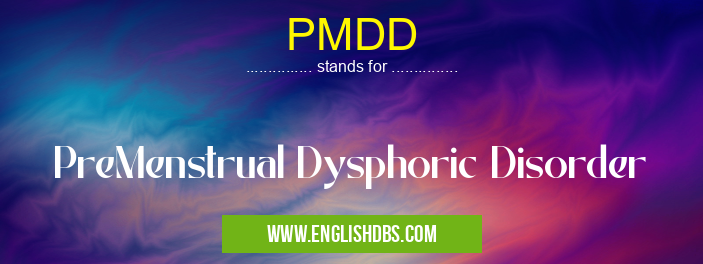What does PMDD mean in CLINICAL MEDICINE
Abbreviations are a common way to shorten phrase in many different disciplines, including medical. PreMenstrual Dysphoric Disorder (PMDD) is a unique form of premenstrual syndrome experienced by some women that can have severe physical and emotional symptoms. PMDD can negatively impact quality of life and may require medical treatment if it becomes debilitating.

PMDD meaning in Clinical Medicine in Medical
PMDD mostly used in an acronym Clinical Medicine in Category Medical that means PreMenstrual Dysphoric Disorder
Shorthand: PMDD,
Full Form: PreMenstrual Dysphoric Disorder
For more information of "PreMenstrual Dysphoric Disorder", see the section below.
Diagnosis
In order to be diagnosed with PMDD, individuals will need to fulfill criteria A through D listed in the DSM-V manual:1 A) Marked affective lability over the course of a month; B) Five or more physical or behavioral symptoms related to the menstrual cycle that occur from one week before your period until several days after your period starts; C) Symptoms are so severe they cause clinically significant distress; D) These symptoms appear consistently through three consecutive cycles.
Treatment Options
Treatment options for PMDD vary depending on an individual’s unique needs but can include lifestyle changes like exercising regularly and avoiding caffeine or alcohol. If these don’t help manage symptoms, medications such as antidepressants may be prescribed by a doctor to help reduce the severity of the condition’s effects. Cognitive Behavioral Therapy (CBT), support groups, and alternative treatments like acupuncture may also provide relief from PMDD related stress or anxiety.
Essential Questions and Answers on PreMenstrual Dysphoric Disorder in "MEDICAL»CLINICAL"
What is PMDD?
PMDD (Premenstrual Dysphoric Disorder) is a severe form of premenstrual syndrome that causes extreme mood swings and physical symptoms in some women before each menstrual cycle. Symptoms can range from feeling overwhelmed, irritable, and anxious to depressed and even suicidal tendencies.
What are the signs of PMDD?
Signs of PMDD vary from person-to-person but typically include depression or intense sadness, anxiety, irritability, changes in appetite, difficulty concentrating or focusing on tasks, insomnia or sleeping too much, chronic fatigue, change in libido, headaches and other physical complaints.
What are the risk factors for PMDD?
Risk factors for developing PMDD include having a family history of mental health issues such as depression and anxiety disorders, having a personal history of mood disorders like major depressive disorder or bipolar disorder, stress due to work or home life and an imbalance in hormones such as estrogen and progesterone.
Is there any science behind the cause of PMDD?
Yes - research has found that serotonin levels play an important role in individuals with PMDD. Serotonin is a neurotransmitter involved in regulating your moods - low levels can contribute to feelings of depression or anxiety while higher levels can have a calming effect on your emotions.
How do I know if I have PMDD?
The best way to determine if you have PMDD is by keeping track of your symptoms throughout the month; look for patterns that occur regularly before the start of your period. If you consistently experience these signs two weeks before menstruation then it's possible you have this condition. It's also helpful to consult with a healthcare professional who specializes in diagnosing this disorder.
Are there any treatments for PMDD?
Yes - treatment for this condition may include lifestyle changes such as reducing stressors and incorporating healthy nutrition into your diet along with exercising regularly; hormone therapy; antidepressant medications; cognitive behavioral therapy (CBT); dietary supplements; acupuncture; yoga/meditation; light therapy; herbal remedies like chasteberry extract; and ovulation suppression techniques such as norethindrone acetate (Lybrel).
How effective are these treatments for managing my symptoms?
The effectiveness varies depending on individual circumstances - making lifestyle changes can help manage milder forms while those with more serious episodes may need to use hormonal techniques along with cognitive therapies and medications to treat their symptoms. However most cases will show signs of improvement after taking steps towards properly managing their condition.
Final Words:
PreMenstrual Dysphoric Disorder (PMDD) is a serious medical condition that requires proper diagnosis and treatment in order for individuals to lead healthy lives free from severe physical and emotional distress associated with their menstrual cycle. Taking proactive steps toward managing monthly symptoms can help reduce their intensity and make it easier for those affected by PMDD to go about their daily lives without disruption caused by this condition.
